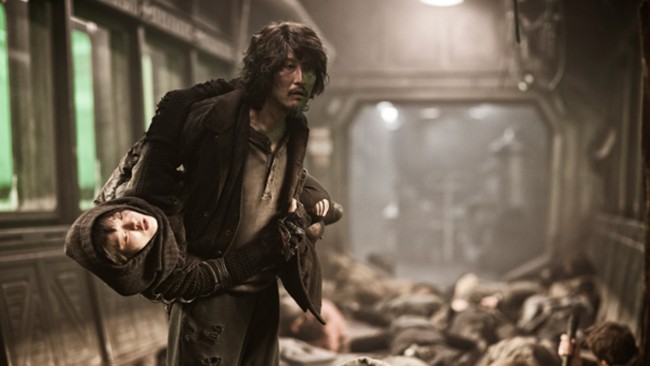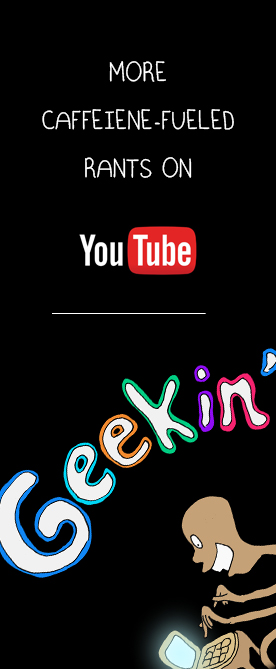Snowpiercer
dir. Joon-ho Bong
How does it end?
A dystopian train bullets round and round and round, endlessly, circumnavigating the world, moving to stay alive, to preserve posterity, without end, and without future. This train, this Snowpiercer: a place where inertia reigns supreme, and fixed hierarchies slavishly adhere to railways and destinies. The poor, the ragged, the fashionably destitute are designated to the back, where life looks a helluva lot like Blade Runner causing Captain America to incite locomotive mutiny. And at the other end of this mythically-powered train rests the great Wilford—the creator, the savior, of whom the uppercrust mentions with high reverence, but the kind of reverence you can tell is marked by fear, like piss on a baby. The poor push back, they ram, they hack through doors—and bodies—they lose some of their own, they bloody others, shoot a pregnant chick, get mowed down by a deliverer of eggs, steal some drugs, and—worst of all—kill Tilda Swinton (Grand Budapest Hotel, Only Lovers Left Alive) before the third act.
All of this to say: the movie’s got one fucked up ending. There’s the obvious drama: the explosion, the death of our two leads—an against-type Chris Evans (Captain America) subverting our expectations of him as the All-American boy scout, and Bong-regular Kang-ho Song (The Host) as the under-emotive, surly Namgoong Minsoo—the hope instilled by an errant, probably starving, polar bear, and—oddly enough—the benefits—at least for this world—of global warming. If you haven’t seen the movie, I’m about to discuss spoilers, and plenty of them—several of which have already been revealed, and for that: I am sorry. For those of you who have seen it, you will remember that the film ends with a bang. A spectacular Kronol explosion. It derails the train and sends it tumbling and screeching ass upwards into a mountain of snow. Collecting Kronol—a highly flammable, highly intoxicating green rock with similar properties to that of heroin—as pay for his service breaking and hacking and sparking through car doors—all of which remain locked to keep the hierarchy intact; borders and boundaries created by the elite—Namgoong Minsoo packs the drug like a slab of C-4 and sticks it to the side of the train. Minsoo wants out. He no longer wants to spin so paralyzed. He’d rather brave it out in the cold, where there’ve been signs of thaw. Minsoo gets his way, and his daughter lights the brick and—boom! Snowpiercer goes kablooey. The crash kills everyone. Everyone but two souls. The last two people on Earth. No one else. Chris Evans is dead, Captain America’s dead, so is Minsoo and Wilford and all the dominatrix-dressed club rats from the pretty party train, so is Jamie Bell and Ed Harris, Tilda Swinton and John Hurt, all these prestigious actors, these recognizable faces, but it’s the Korean girl and the black boy—a teenager, a Kronol tweaker, and a five-year-old baby, respectively—that’s left. Them, and a hungry polar bear.
Sure, I suppose you could say that the ending’s blue skies and dandelions, and you could say that and point to the surviving members and leave the theater and not think about it anymore—because, after all: at least someone outlived this most tragic of train commutes. (I count my blessings every time I step onto the five train and the car’s free of black hooded men and their battle axes). But that would prove too optimistic for Mr. Joon-ho Bong. And optimistic, he is not.
Now, let’s project a little:
We have two people left. And, if we believe the movie and its characters, the last two people on Earth. Earth’s “final hope,” so to speak. That’s a weighty place to be. A weighty responsibility. Furthermore, our “final hope” consists of a teenage girl and a five-year-old boy. The girl has proven resourceful, shrewd, and bold enough to blow shit up, but the boy’s just a boy, and like all boys he must be taken care of, and now, that job—that role—belongs to Yona—daughter to the incinerated Minsoo. You know what else is Yona’s job?—in this world of posterity, where the main goal—at least for some—is creating something—say, an engine (or child)—so reliable and efficient, so perpetual, so grand and God-like, so fucking divine and holy, an engine (or child) large enough to be praised and worshiped, an engine (or child) so revered as to bloat and sooth and supplement the ego and remind the world of big cocks, tiny cocks—cocks of all sizes—and of Bong’s world of egg-headed men and pregnant teachers, of children as train gears, of perfectly balanced ecosystems, of biology, of human need, want, and compulsion, of sex and adaptation—in the eyes of aaaaaalll that: you know what else young Yona now must do?
Of course you do.
Yona must seduce the boy. Not then, not there—especially not in front of the polar bear. But down the line, in the future, once the impossible truth has settled and become an easy reality, logically unquestionable—that there is abso-fucking-lutely no one else left on this planet but this kid here beside her—the urge will arrive. It will return, as will the quake for children, the fear of death, the design to hunt for an afterlife, for immortality. Yona will have to sleep with this boy, her adoptive child. She will have to splinter herself and delineate: time of train, time of motherhood, time of actual motherhood. It’s such a wicked and deflating thought. The troubles aren’t over. Aside from the issues of age and sexual responsibility, there’s the issue of location, weather, and rations. Sure, the world’s thawing, still doesn’t mean it’s returned to form or melted enough to embrace these two specks of dust with sustenance and warmth. It’s still a fucked situation, either way you slice it. But still, the film’s done its subliminal number on you at this point—with the eggs, the pregnant teacher, the poor having their children whisked away, enslaved, and sometimes eaten—we’re thinking propulsion, we’re thinking big, steely trains; we’re thinking about maternity, about Tilda Swinton’s Mason scolding the back of the train like a mother would her children; about men killing and yelling to prove the length of their ego, of their fears of death, of their inability to self-sacrifice; we’re thinking birth, revolution, circle, circle, dot, dot, now I got my cootie shot; we’re thinking of the infinite and of our sole means of getting there: procreation.
It’s amazing: even in the face of extinction, when our numbers dwindle so low as to question the brief fallacy of humanity, we are still able to concern ourselves with questions of God and vanity, of justice, of what’s right and wrong. The entire world’s been blanketed by a fatal tundra, and yet, we’re still “civilized” enough to instill a class structure, to think of saunas and sushi, to wear a terribly ugly pair of false teeth rather than go empty mouthed, biteless. And hell, there’s still fight in these people—in all of them—but what exactly are they fighting for? They don’t fight just to live, they fight to live better. Because they deserve better—or at least they think they do. Because they’re still people, flesh and blood and bone, and everyone’s special and should be treated equally and looked upon like a singular beacon of talent and individuality and—excuse me, I’ve lost my train of thought.
When it comes down to it: Mr. Bong’s a dirty bird with a twisted and cynical outlook on our future. What’s most frightening of all is that none of it seems put on. We don’t get any of the laborious depression or pretension of an early Alejandro Inarritu film, like Amores Perros and 21 Grams—oh! and the impossibly morose Biutiful—instead we get the sense that Bong’s artistic mettle is of a dark, blacker-than-black substance. It is hopeless. The future’s as good as done, like gunning it into a brick wall, no seatbelt on, no crash bags deployed, just the eternal accordion-like crunch of our demise—and that brick wall, just noses away, maybe even a hair’s width away, absolute in its conclusion. Because, even if you read Snowpiercer the way I read Snowpiercer, with all those icky, Chinatown-like overtones of inappropriateness—a word which I’m sure would quickly lose all meaning and gravitas once the world shrunk to a handful of baby-eaters—the chances of a teenage girl and little boy surviving the elements of that remorseless land, without food, without means of fighting off disease, bacteria—any and all sickness—are slim to none. It’s shit upon shit. So, if they do survive, that means a weird and confusing series of conversations between son and pseudo-mom about why things are about to get superduper real—or! instead, a couple of slow and lonely deaths totally ignored by the cosmos—the snuffing of a whole species, which, according to Bong, is an irresponsible speck of a species.
Ugh…what a length of ramble. I guess this is where I get off.
But the rest of you should use this opportunity to chug on, to keep that momentum going and fuck around and propagate our already-overpopulated world, recklessly, and with the hope that your children will turn into the most special of the specials. Keep fucking, keep popping them out, without thought, without worry that this is how it all slips into decline: when ego and awareness is finally introduced to the animal world.
Mind you: those’re Bong’s thoughts, not mine.
(…maybe…)
But it doesn’t really matter: none of us’ll have to witness the true horrors anyway. Not in our lifetime. So I say check yourself at the door, beautiful people, and just have fun with it.
No worries, no worries.






